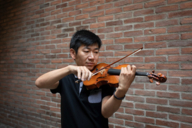
We talked to four members of the biggest orchestra in Munich about their instruments. In this interview, you can learn more about the Munich Philharmonic Yusi Chen, his way to the violin and why it is not just about playing notes.
“When I learned to play the violin as a child in China, the instrument was something almost exotic, and not necessarily popular. It was the start of the 80s when I started learning the instrument in my home town of Harbin. I was five years old, my father played music as a hobby, and I caught a love of music from him. We weren’t rich, but my granddad scraped together all he had and founded a little music school. I visited that music school often, pressing my nose right up against the window of the violin room. The teacher noticed it and asked me again and again when I was going to join the class. Eventually I was allowed to learn the violin, and I was very good at it.
When I was 14, my mother worked hard to get me a training place in Tianjin, 150 kilometres from Beijing, because she had been told that they had good teachers there. I passed the entrance exam and was able to join the secondary school for music there – it is a little like the music academies you have in Germany – and study violin more intensively for the next few years. Mind you, I didn’t know that I would become a professional musician some day.
After school I had a Russian teacher, and we talked about whether I would be able to study violin in his home city of Odessa. In any case, it was clear that I would have to study abroad if I wanted to keep up on an international scale. Another violinist advised me to go to America or Europe. Then I met a guy who lived in Berlin, who helped me with my visa and with setting up an audition in Berlin. He spoke so highly of Germany that in 2000, I went to Berlin to study under Professor Eberhard Feltz at the Hanns Eisler School of Music, after passing the entrance examination.
During this time, I played a lot of chamber music. It was really lovely to be able to make music together with others. It suited me because I am the type of person who enjoys working and communicating with others. I completed my studies after five years and then began to focus on finding a place in an orchestra. I applied in Leipzig and Munich, where I eventually secured a position with the Philharmonic Orchestra. At first I only had a one-year contract, and then after an interlude in Stuttgart I was offered a permanent position in 2008. I didn’t expect any of that when I started playing violin.
I think that music comes from within – you have to have an inner feeling to be able to speak outwardly.
My family made a lot of things possible for me. That was the benefit of China’s one child policy: parents did everything they could to offer their only child all the education they could afford. Over the last 30 years, 40 million Chinese children have learned piano or violin. Almost every child learns an instrument and more and more of them would settle on the piano or the violin. Of course, this gives rise to stiff competition between parents in terms of whose children will go furthest. I think that music comes from within – you have to have an inner feeling to be able to speak outwardly. It’s not just about playing notes and mastering the finer details of tone development and tonal colouring, but also about how you tell a story and what emotions you use to do so. That is what makes the difference.
Chinese people are rather reserved with their emotions and put a lot of importance on respect. But for music you need imagination, personality and the ability to enjoy things freely and think positively. I feel very much at ease in Munich, and I am not all that homesick for China. That might partly be because I left home at 14 and have lived in different places ever since. I have always moved around and I can firmly say that at some point, the world became my home. My wife plays oboe at Theater Regensburg, we have a house in Munich and we speak both Chinese and German with our young son, as he really needs to learn the two languages while he is small. Back when I arrived in Berlin, the language was the biggest problem. I had to take a German course first, and I was lucky that my teacher was a very patient person. I think as a foreign musician in Germany, you need to be a bit better than the others, especially if you want a permanent position. But in terms of preconceptions about Chinese people, I have to say that they are great: people think we are very hard-working and anxious to assimilate. Which is true. Germany has given us the chance to secure a good position. That is very fortunate for us.”
Also interesting:
Konstantin Sellheim and his way to the viola
Raffaele Giannotti and his way to the bassoon
Teresa Zimmermann and her way to the harp